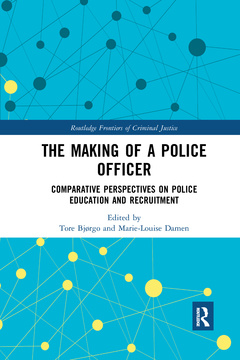The Making of a Police Officer Comparative Perspectives on Police Education and Recruitment Routledge Frontiers of Criminal Justice Series
Coordonnateurs : Bjørgo Tore, Damen Marie-Louise

Does a more academic type of police education produce new police officers that are reluctant to patrol the streets? What is the impact of gender diversity and political orientation on a police students? career aspirations and attitudes to policing? These are some of the questions addressed by this longitudinal project, following police students in seven European countries. The unique data material makes it possible to explore a wide range of topics relevant to the future development of policing, police education and police science more generally.
Part I presents an overview of the different goals and models of police education in the seven participating countries. Part II describes what type of student is attracted to police education, taking into consideration educational background, political orientation and career aspirations. Part III shows the social impact of police education by examining students? orientations towards emerging competence areas; students? career aspirations; and students? attitudes concerning trust, cynicism and legalism.
The overall results show that police students are strikingly similar across different types of police education. Students in academic institutions are at least as interested in street patrolling as students in vocational training institutions. Gender and recruitment policies matters more in relation to career preferences than education models. The national context plays a more important role than the type of police education system. Written in a clear and direct style, this book will appeal to students and scholars in policing, criminology, sociology, social theory and cultural studies and those interested in how police education shapes its graduates.
1. A longitudinal and comparative European study of Recruitment, Education and Careers in the Police (RECPOL): what this project contributes to the development of police science, Tore Bjørgo and Marie-Louise Damen, 2. Police education in seven European countries in the framework of their police Systems, Kjersti Hove and Lola Vallès. 3. Diversity and academisation: who does police education attract?, Rasmus Juul Møberg, 4. Iceland as a microcosm of the effects of educational reform on police students’ social background, Guðmundur Oddsson, Andrew Paul Hill, Ólafur Örn Bragason, Þóroddur Bjarnason and Kjartan Ólafsson, 5. Mirroring society: how politically representative are police students in Europe?, Gunnar Thomassen, 6 . Understanding learning preferences and career expectations of Norwegian police students from a comparative perspective, Pål Winnæss, Marie-Louise Damen and Gunnar Thomassen, 7. Police students’ values of enduring and emerging competence areas in police education, Staffan Karp, Kirsi Kohlström, Oscar Rantatalo and Mojgan Padyab, 8. Horizontal and Vertical career preferences for male and female police recruits, Rasmus Juul Møberg and Marie-Louise Damen, 9. Cynicism and (dis)trust in the police: Self-selection or evolving attitudes?, Gunnar Thomassen and Jon Strype, 10. Producing legalists or Dirty Harrys? Police education and field training, Silje Bringsrud Fekjær and Otto Petersson 11. Selecting and shaping police students in Europe: main findings and discussion, Marie-Louise Damen and Tore Bjørgo
Tore Bjørgo is a professor at the University of Oslo and an adjunct professor of police science at the Norwegian Police University College. He is also director of the Center for Research on Extremism (C-REX). He initiated the RECPOL project in 2008 and has been leading it since the start until recently. He has published extensively in the fields of violent extremism and terrorism, criminal gangs, crime prevention, policing and vigilantism.
Marie-Louise Damen is an associate professor in quantitative research methods at the Norwegian Police University College in Oslo. Her research interests are sociology of higher education, stratification, cultural sociology, social movements and research methodology. Since October 2017 she has been involved in the RECPOL-project and has gradually taken over as coordinator.
Date de parution : 06-2022
15.6x23.4 cm
Date de parution : 02-2020
15.6x23.4 cm
Thème de The Making of a Police Officer :
Mots-clés :
Police Education Programs; Comparative Criminology; Police Students; European Criminology; Police Education; Longitudinal research; Vice Versa; ECTS; Police Organization; European Social Survey; Police Practice; Police Education Systems; Police Science; Police Recruits; Police Training; Police Force; Police Work; Police Services; cynicism; Investigative Police Work; European Qualifications Framework; Education Systems; Non-legalistic Measures; legalism; Nordic Countries; RECPOL countries; Catalan Students; Police Tasks; Operational Police Work; Icelandic Police; Female Police; Female Recruits; Didactic Triangle; Preventive Police Work; Special Operations Unit; Statistics Iceland



